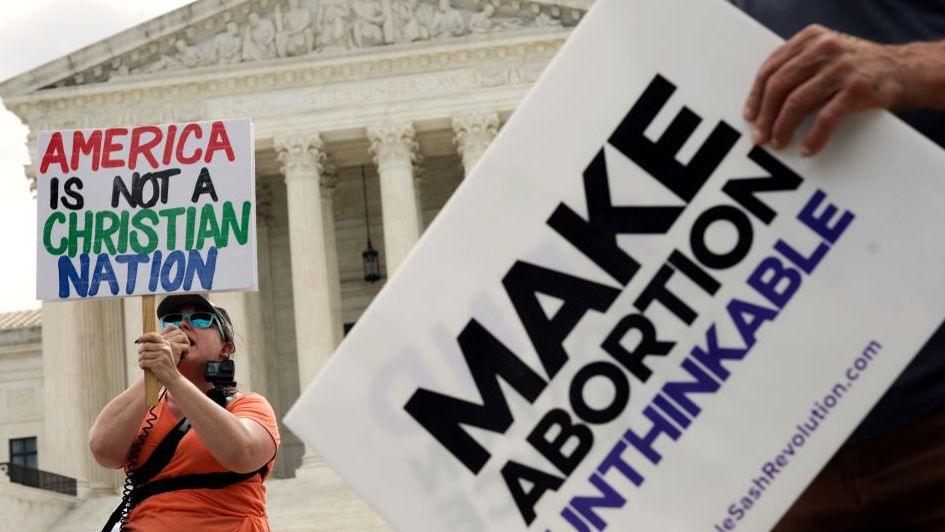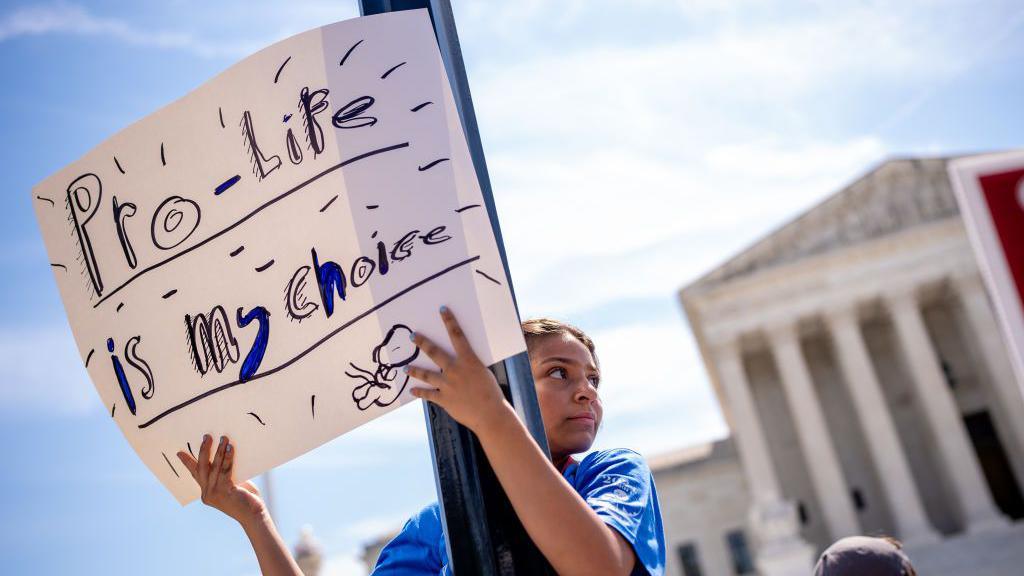What are the abortion laws in US states?

- Published
Abortion rights are back in the spotlight in the US as the country heads into its presidential election between Democratic Vice-President Kamala Harris and her Republican opponent Donald Trump.
The state of access in the US has been in flux for more than two years, since the Supreme Court overturned Roe v Wade and rescinded the constitutional right to abortion.
The June 2022 decision returned control over the procedure back to individual states. Access now varies depending on where you are. Some states have enacted total bans, while others protect the procedure throughout pregnancy.
This patchwork map of rights will change again after the November election. Exactly how it changes will depend on who wins.
Ms Harris has promised to "restore" abortion rights federally while Mr Trump has said recently he will leave the issue to states. Some states are also voting in referendums specifically on abortion.
Here's a look at where things stand, and how they might change.
What is Roe v Wade?
In 1973, in a case called Roe v Wade, the Supreme Court ruled that a woman's right to terminate her pregnancy was protected by the US Constitution up until the point of foetal viability, which is about 24 weeks.
The landmark 7-2 decision established a framework to govern abortion based on a "trimester" system.
In the first three months, or trimester, of pregnancy, women were granted an almost absolute right to abortion. In the second trimester it allowed regulations to protect women's health. And in the third, it allowed states to ban abortions as long as exceptions were made for the health and life of the mother.
This system remained in place for nearly 50 years, until the court overturned Roe and the nationwide constitutional right to abortion access.
There were just over one million legal abortions performed in the US in 2023 - the first full calendar year since Roe was overturned - according to a study by the Guttmacher Institute, external, a pro-choice research group. This marked an 11% increase from 2020, and the first time since 2012 that more than 1 million abortions were recorded in the US.
Where is abortion banned in the US?
Access to legal abortion in the US now depends on where you are.
As of August 2024, 17 states have outlawed nearly all abortions, banning the procedure at six weeks of pregnancy or earlier. Some have narrow exceptions for cases of rape, incest or the health of the mother.
These states, including Texas, Florida, and Alabama, are under Republican control, with many clustered in the US South.
Another eight states allow some access to the procedure. These states bar abortion some time between 12 and 23 weeks of pregnancy.
The remaining 25 states, plus the District of Columbia, protect abortion. Nine of these states as well as DC do not restrict abortion based on gestational duration.
This does not mean that anyone who wants an abortion at this stage can have one.
On the contrary, abortions after 21 weeks pregnancy are rare and difficult to obtain - representing just 1% of all abortions in the US, according to the non-profit health organisation KFF, external.
They are only performed by a small number of providers, KFF says, and are often related to medical concerns like foetal anomalies or threats to the life of the mother.
What about abortion pills?
Medication abortion is now the most common method of ending a pregnancy in the US and involves two drugs - mifepristone and misoprostol.
The US Food and Drug Administration has approved the two-step regimen for use up until 10 weeks of pregnancy.

Abortion access in the US varies dramatically by state
Abortion bans cover both surgical and medication abortion, meaning healthcare providers in these states are prohibited from prescribing abortion pills.
But in some cases, abortion medication has been used to circumvent these bans. Some medical professionals in abortion-friendly states have begun prescribing the pills and sending them by mail to patients in restrictive states.
In response, some states that oppose abortion are taking extra steps to curb the illegal use of abortion pills.
Harris and Trump accuse each other of lying on abortion
Will abortion matter in the US election?
Yes. Polls show the majority of Americans - around two-thirds, external - support legal access to abortion. And the number of Americans who say they would only vote for a candidate who shares their views on abortion has reached a record high of 32%, external.
This broad support for abortion is expected to benefit Vice-President Kamala Harris's bid for the White House. In the time since Roe was overturned, the issue has handed Democrats a series of unexpected wins, including in the 2022 midterm elections and the Virginia state elections.
And since taking over the reins from Joe Biden, Ms Harris has enthusiastically embraced reproductive rights as a key promise of her candidacy. She has promised to support legislation that would protect abortion rights nationally.
Former President Donald Trump, the presumptive Republican presidential nominee, campaigned in 2016 on appointing justices who would reverse Roe. He appointed three justices while in office, all of whom voted to overturn Roe.
In recent months, Mr Trump has said he supports the authority of US states to govern abortion.
Mr Trump has also faced scrutiny over the proposed abortion policies in Project 2025, a detailed blueprint for the next Republican administration. Mr Trump has disavowed the document, which was written by several alumni of the Trump White House.
Legal experts say the policies outlined in Project 2025 amount to a de facto national abortion ban.
Abortion itself will be also on the ballot in several states. So far, 11 states including Florida, Arizona, Maryland and Nebraska have confirmed referendums on abortion access for November.
Hear from Arizonans on both sides of the abortion debate
How does the US compare globally on abortion?
A large majority of countries allow abortion under at least some circumstances.
Most industrialised countries permit the procedure without restriction, according to the Council of Foreign Relations (CFR), a non-partisan thinktank, with the global trend in abortion law moving towards liberalisation.
In the last 30 years, more than 60 countries have changed their abortion laws and all but four - the US, El Salvador, Nicaragua, and Poland - expanded legal access, the CFR said.
In Ireland, for example, parliament in 2018 legalised abortion before 12 weeks of pregnancy, and later in pregnancy when the mother's life is at stake.
In other western countries, abortion laws are comparable to US states that allow abortion at least until the second trimester.
Women in France are guaranteed abortion access until 14 weeks of pregnancy. In the UK, abortions can be carried out until 24 weeks of pregnancy, with abortions after that in limited circumstances, like if the mother's life is at risk. In Canada, there is no gestational limit on abortion.